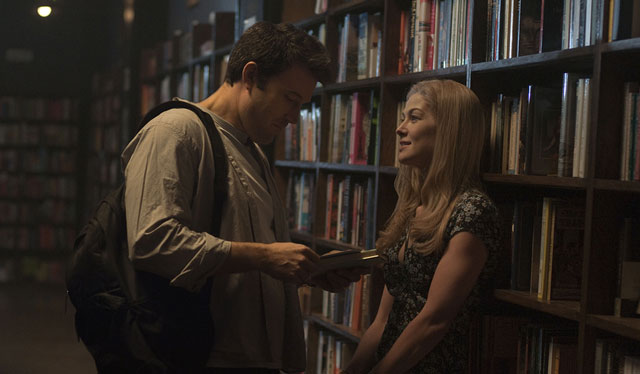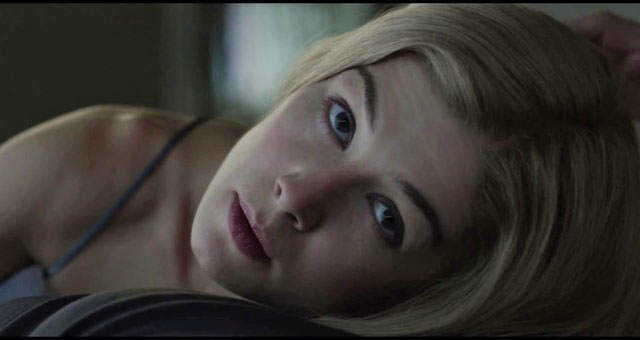
A harrowing dark comedy about a collapsed marriage. A savage satire of media sensationalism. A meticulous police procedural. And a sleek neo-noir thriller. Gone Girl from director David Fincher confidently splices these strands of DNA into a beautiful, complicated monster of a film with an irredeemably black heart.
Fincher’s adaptation of Gillian Flynn’s ballyhooed 2012 crime novel is about as perfect a matching of director, actors and subject matter as you could hope to see. Working from a script prepared by Flynn, Fincher uses the potboiler plot about a missing woman to conduct a forensic investigation of a toxic marital union and the society that surrounds it.
Ben Affleck — who has been on a roll of late both in front of the camera and behind it — is almost too perfectly cast as Nick Dunne, one half of the failing marriage in question. Dunne is an out-of-work writer, whose trust fund princess wife Amy goes missing on their fifth anniversary. He’s initially treated sympathetically by the folk of the Missouri town where he grew up and currently lives.
But it doesn’t take long before a sensation-greedy talk show host, cops and neighbours are all questioning whether Nick had a hand in Amy’s disappearance. Nick is a liar, a freeloader and a cheat with a barely bottled-up antipathy for his wife. But does the fact that he’s too quick to flash a smile full of teeth for the camera at the wrong moment mean that he’s capable of murder?
With hints of violence beneath the smug surface of his Nick, the square-jawed Affleck excels here as he often does with roles about golden boys who have tumbled from grace. But the film is really a showpiece for the underrated Rosamund Pike, here cast as a frosty, neurotic wife with a ferocious resentment of her husband.
Watch the Gone Girl trailer:
Pike, who has all too often been saddled with second-rate material, turns her Amy into an emotionally unavailable blonde of the sort that Hitchcock was so fond of. She brings nuance to a role that isn’t necessarily sympathetic, colouring her part with empathy for a woman whose interior life doesn’t align with the part of the perfect wife and daughter she’s expected to act out in the real world.
Echoing the structure of the novel, Fincher alternates between showing the events surrounding Amy’s disappearance through Nick’s eyes and chronicling their passionate courtship and the rapid deterioration of their marriage in Amy’s voice. From Nick’s perspective, Amy is shrewish and distant; from hers, he’s a boor and a layabout. As in every failed marriage, each side has a point.
Fincher uses an expansive two-and-a-half-hour running time to peel back the layers of his characters to show what lies beneath the parts they play for each other and the rest of the world. He keeps on a sure tonal footing, even as he leaps from the frothy romance of Nick and Amy’s early years to the bitter rows when both lose their jobs in the recession, and the media circus that pitches tent when Amy disappears.

To say more would be to wander into spoiler territory, but Gone Girl has a psychological acuity and a stylish presentation that elevates it far above the average thriller. I’m not crazy about the ending, which is a little too pat, but the twists and turns that get there are constantly thrilling. Look out for some good support acting, including unexpected turns for Neil Patrick Harris as Amy’s creepy but debonair ex-boyfriend and Tyler Perry as an oily, headline-hungry defence attorney.
Gone Girl cements Fincher’s place as one of the most consistent Hollywood directors of the past 20 years. It’s every bit as good as Zodiac and The Social Network. Like Alfred Hitchcock or Henri-Georges Clouzot, Fincher shows himself able to use the trappings of a psychological thriller to look deep into the human heart and what makes it beat. — © 2014 NewsCentral Media




